LG F0K6DMK2S2P Owner’s Manual
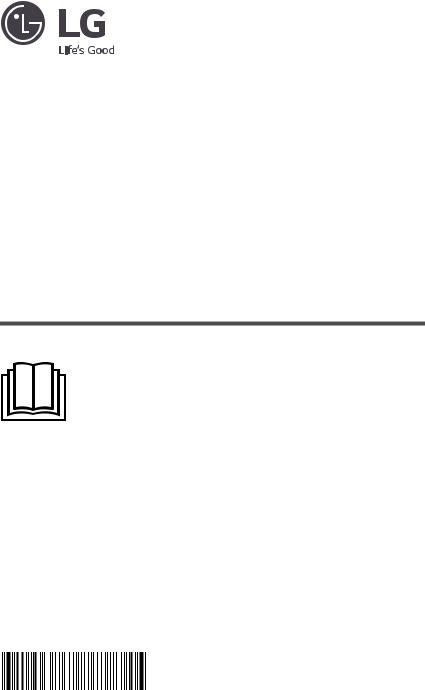
OWNER'S MANUAL
WASHER-DRYER
Before beginning installation, read these instructions carefully. This will simplify installation and ensure that the product is installed correctly and safely. Leave these instructions near the product after installation for future reference.
EN ENGLISH
F0K6DMK2S2P
www.lg.com
MFL71485485 |
Copyright © 2020 LG Electronics Inc. All Rights Reserved. |
Rev.00_032720 |

TABLE OF CONTENTS
This manual may contain images or content that may be different from the model you purchased.
This manual is subject to revision by the manufacturer.
SAFETY INSTRUCTIONS ................................. |
3 |
READ ALL INSTRUCTIONS BEFORE USE............................ |
3 |
WARNING............................................................................. |
3 |
INSTALLATION ............................................... |
9 |
Parts and Specifications..................................................... |
9 |
Installation Place Requirements ..................................... |
11 |
Unpacking the Appliance................................................. |
12 |
Levelling the Appliance .................................................... |
13 |
Connecting the Water Supply Hose................................ |
15 |
Installing the Drain Hose ................................................. |
17 |
OPERATION .................................................. |
18 |
Operation Overview ......................................................... |
18 |
Preparing the Wash Load ................................................ |
18 |
Adding Detergents and Softeners.................................. |
19 |
Control Panel..................................................................... |
22 |
Programme Table............................................................. |
24 |
Drying Programme........................................................... |
27 |
Extra Options and Functions ........................................... |
28 |
SMART FUNCTIONS...................................... |
31 |
LG ThinQ Application........................................................ |
31 |
Smart Diagnosis................................................................ |
33 |
MAINTENANCE............................................. |
34 |
Cleaning After Every Wash .............................................. |
34 |
Cleaning the Appliance Periodically & Performing an |
|
Emergency Water Evacuation ......................................... |
35 |
TROUBLESHOOTING .................................... |
38 |
Before Calling for Service ................................................ |
38 |
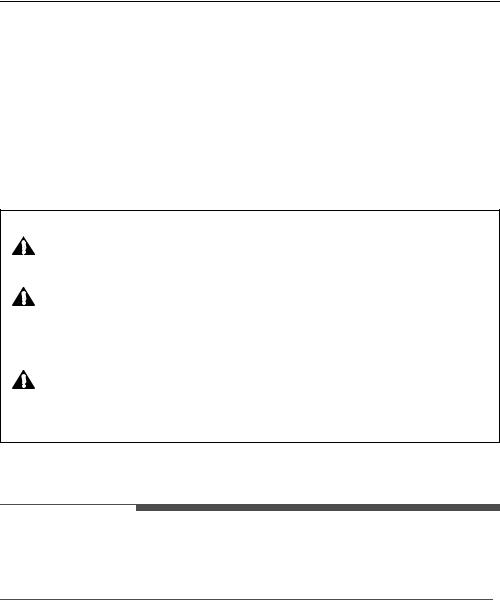
SAFETY INSTRUCTIONS 3 EN
SAFETY INSTRUCTIONS
READ ALL INSTRUCTIONS BEFORE USE
The following safety guidelines are intended to prevent unforeseen risks or damage from unsafe or incorrect operation of the appliance.
The guidelines are separated into ‘WARNING’ and ‘CAUTION’ as described below.
Safety Messages
This symbol is displayed to indicate matters and operations that can cause risk. Read the part with this symbol carefully and follow the instructions in order to avoid risk.
WARNING
This indicates that the failure to follow the instructions can cause serious injury or death.
CAUTION
This indicates that the failure to follow the instructions can cause the minor injury or damage to the product.
WARNING
 WARNING
WARNING
To reduce the risk of explosion, fire, death, electric shock, injury or scalding to persons when using this product, follow basic precautions, including the following:
Technical Safety
•This appliance is not intended for use by persons (including children) with reduced physical, sensory or mental capabilities, or lack of experience and knowledge, unless they have been given supervision or instruction concerning use of the appliance by a person responsible for their safety.

EN 4 SAFETY INSTRUCTIONS
•Children should be supervised to ensure that they do not play with the appliance.
•If the power cord is damaged, it must be replaced by the manufacturer, its service agent or similarly qualified persons in order to avoid a hazard.
•Use a new hose or hose-set supplied with the appliance. Reusing old hoses can cause a water leak and subsequent property damage.
•Ventilation openings must not be obstructed by a carpet.
•This appliance is intended to be used in household only.
•The inlet water pressure must be between 100 kPa and 1000 kPa.
Maximum Capacity
The maximum capacity in some cycles for dry clothes to be used is
Wash (14 kg)/Dry (8 kg).
Technical Safety for Using the Dryer
•Do not dry unwashed items in the appliance.
•Items that have been soiled with substances such as cooking oil, vegetable oil, acetone, alcohol, petroleum, kerosene, spot removers, turpentine, waxes and wax removers should be washed in hot water with an extra amount of detergent before being dried in the appliance.
•Never stop the appliance before the end of the drying cycle unless all items are quickly removed and spread out so that the heat is dissipated.
•Items such as foam rubber (latex foam), shower caps, waterproof textiles, rubber backed articles and clothes or pillows fitted with foam rubber pads should not be dried in the appliance.
•Fabric softeners, or similar products, should be used as specified by the fabric softener instructions.
•Remove all objects from pockets such as lighters and matches.
•The appliance is not to be used if industrial chemicals have been used for cleaning.

SAFETY INSTRUCTIONS 5 EN
Installation
•Never attempt to operate the appliance if it is damaged, malfunctioning, partially disassembled, or has missing or broken parts, including a damaged cord or plug.
•This appliance should only be transported by two or more people holding the appliance securely.
•Do not install the appliance in a damp and dusty place. Do not install or store the appliance in any outdoor area, or any area that is subject to weathering conditions such as direct sunlight, wind, rain, or temperatures below freezing.
•Make sure the power plug is completely pushed into the power outlet.
•Do not plug the appliance into multiple outlet sockets, power boards, or an extension power cable.
•Do not modify the power plug provided with the appliance. If it does not fit the power outlet, have a proper outlet installed by a qualified electrician.
•This appliance is equipped with a power cord having an equipmentearthing / grounding conductor (earthing pin) and a grounding power plug. The power plug must be plugged into an appropriate outlet socket that is installed and earthed / grounded in accordance with all local codes and ordinances.
•Improper connection of the equipment-grounding conductor can result in risk of electric shock. Check with a qualified electrician or service personnel if you are in doubt as to whether the appliance is properly grounded.
•This appliance must not be installed behind a lockable door, a sliding door or a door with a hinge on the opposite side to that of the appliance, in such a way that a full opening of the appliance door is restricted.
Operation
•Do not apply any sharp objects to the control panel in order to operate the appliance.

EN 6 SAFETY INSTRUCTIONS
•Do not attempt to separate any panels or disassemble the appliance.
•Do not repair or replace any part of the appliance. All repairs and servicing must be performed by qualified service personnel unless specifically recommended in this Owner's Manual. Use only authorized factory parts.
•Do not push down the door excessively, when the appliance door is open.
•Do not put animals, such as pets into the appliance.
•Do not wash rugs, mats, shoes or pet blankets, stuffed toys, or any other items other than clothes or sheets, in this machine.
•Keep the area underneath and around the appliance free of combustible materials such as lint, paper, rags, chemicals, etc.
•Do not leave the appliance door open. Children may hang on the door or crawl inside the appliance, causing damage or injury.
•Do not put in, wash or dry articles that have been cleaned in, washed in, soaked in, or spotted with combustible or explosive substances (such as waxes, wax removers, oil, paint, gasoline, degreasers, drycleaning solvents, kerosene, petrol, spot removers, turpentine, vegetable oil, cooking oil, acetone, alcohol, etc.). Improper use can cause fire or explosion.
•Do not use or store flammable or combustible substances (ether, benzene, alcohol, chemical, LPG, combustible spray, gasoline, thinner, petroleum, insecticide, air freshener, cosmetics, etc.) near the appliance.
•Never reach into the appliance while it is operating. Wait until the drum has completely stopped.
•Do not touch the door during a high temperature programme.
•In case of a water leak from the appliance or flood, disconnect the power plug and contact the LG Electronics customer information centre.
•Turn off water taps to relieve pressure on hoses and valves and to minimize leakage if a break or rupture should occur. Check the condition of the fill hoses; they should be replaced after 5 years.

SAFETY INSTRUCTIONS 7 EN
•If there is a gas leakage (isobutane, propane, natural gas, etc.) within the home, do not touch the appliance or power plug and ventilate the area immediately.
•If the drain hose or inlet hose is frozen during winter, use it only after thawing.
•Keep all washing detergents, softener and bleach away from children.
•Do not touch the power plug or the appliance controls with wet hands.
•Do not bend the power cable excessively or place a heavy object on it.
•Avoid touching any water that is drained from the appliance during the wash.
•Make sure that drainage is working properly. If water is not drained properly, your floor may get flooded.
•When the air temperature is high and the water temperature is low, condensation may occur and thus wet the floor.
•Wipe off dirt or dust on the contacts of the power plug.
Maintenance
•Disconnect the appliance from the power supply before cleaning the appliance. Setting the controls to the OFF or stand by position does not disconnect this appliance from the power supply.
•Securely plug the power plug in the outlet socket after completely removing any moisture and dust.
•Do not spray water inside or outside the appliance to clean it.
•Never unplug the appliance by pulling on the power cable. Always grip the power plug firmly and pull straight out from the outlet socket.
•Only qualified service personnel from LG Electronics service centre should disassemble, repair, or modify the appliance. Contact an LG Electronics customer information centre if you move and install the appliance in a different location.

EN 8 SAFETY INSTRUCTIONS
Disposal
•Before discarding an old appliance, unplug it. Cut off the cable directly behind the appliance to prevent misuse.
•Dispose of all packaging materials (such as plastic bags and styrofoam) away from children. The packaging materials can cause suffocation.
•Remove the door before disposing of or discarding this appliance to avoid the danger of children or small animals getting trapped inside.

INSTALLATION 9 EN
INSTALLATION
Parts and Specifications
NOTE
• Appearance and specifications may change without notice to improve the quality of the appliance.
Front View |
|
Rear View |
|||||||||
|
|
|
|
|
|
|
|
|
|
|
|
|
|
|
|
|
|
|
|
|
|
|
|
|
|
|
|
|
|
|
|
|
|
|
|
|
|
|
|
|
|
|
|
|
|
|
|
|
|
|
|
|
|
|
|
|
|
|
|
|
|
|
|
|
|
|
|
|
|
|
|
|
|
|
|
|
|
|
|
|
|
|
|
|
|
|
|
|
|
|
|
|
|
|
|
|
|
|
|
|
|
|
|
|
|
|
|
|
|
|
|
|
|
|
|
|
|
|
|
a Control Panel |
a Power Plug |
b Detergent Dispenser Drawer |
b Transit Bolts |
c Drum |
c Drain Hose |
d Door |
|
e Cover Cap |
|
f Drain Pump Filter |
|
g Drain Plug |
|
h Levelling Feet |
|

EN 10 INSTALLATION
Accessories
*1:The included accessories vary depending on the model you purchased.
a |
Cold Supply Hose |
d |
Anti–slip Sheets*1 |
|
|
|
|
b |
Spanner |
e |
Elbow Bracket for Securing Drain Hose |
|
|
|
|
c |
Caps for Covering Transit Bolt Holes |
f |
Tie Strap*1 |
|
|
|
|
Specifications
Model |
F0K6DMK2S2P |
|
|
Power Supply |
220‒240 V~, 50 Hz |
|
|
Maximum Power |
2000-2200 W (Wash) / 2100-2300 W (Dry) |
|
|
Dimension (Width X Depth X Height) |
645 mm X 770 mm X 940 mm |
|
|
Product Weight |
81 kg |
|
|

INSTALLATION 11 EN
Installation Place Requirements
Before installing the appliance, check the following information to make sure that the appliance should be installed in a correct place.
Installation Location
•This appliance must be installed on firm flooring to minimize vibration during the spin cycle. Concrete flooring is best, being far less prone to vibration during the spin cycle than wooden floorboards or a carpeted surface.
•If it is impossible to avoid positioning the appliance next to a gas cooker or coal burning stove, an insulation (850 X 600 mm) covered with aluminum foil on the side facing the cooker or stove must be inserted between the two appliances.
•Ensure that when the appliance is installed, it is easily accessible for an engineer in the event of a breakdown.
•When installing the appliance, adjust all four feet using the transit bolt spanner provided to ensure the appliance is stable.
Floor Installation
To ensure sufficient clearance for water inlet hoses, drain hose and airflow, allow minimum clearances of at least 20 mm at the sides and 100 mm behind the appliance. Be sure to allow for wall, door, or floor moldings that may increase the required clearances.







 B
B
|
A C |
C |
|
|
|
A |
|
100 mm |
|
|
|
B |
|
5 mm |
|
|
|
C |
|
20 mm |
|
|
|
 WARNING
WARNING
•This appliance must only be used for domestic household purposes and should not be used in mobile applications.
NOTE
•Never try to level any uneven floor by putting pieces of wood, cardboard or similar materials under the appliance.
Wooden Floors (Suspended Floors)
When installing the appliance on wooden floors, use rubber cups to reduce excessive vibration and unbalance. Timber or suspended type flooring may contribute to excessive vibration and unbalance, errors and malfunction.
•To reduce vibration, we recommend placing at least 15 mm thickness of rubber caps a under each adjusting foot of the appliance, secured to at least two floor beams with screws.
•If possible, install the appliance in one of the corners of the room, where the floor is more stable.
•Fit the rubber cups to reduce vibration.
 CAUTION
CAUTION
•If the appliance is installed on the unstable floor (e.g. wooden floor), the warranty does not cover any damages and cost occurred due to the installation on the unstable floor.
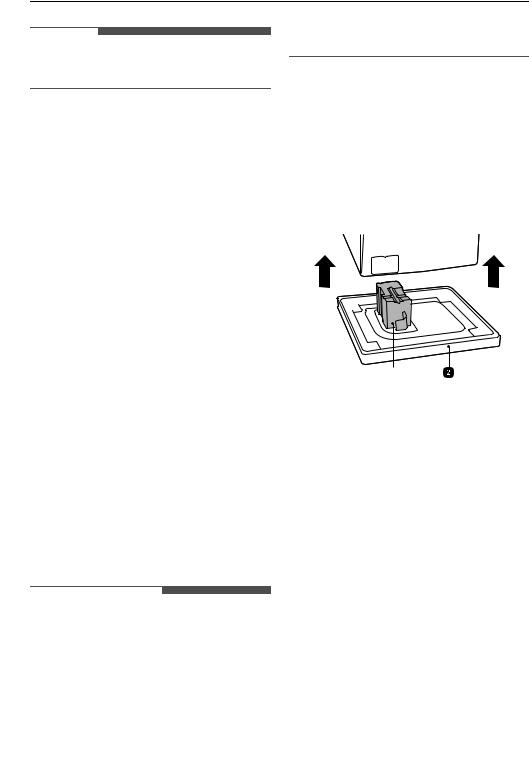
EN 12 INSTALLATION
NOTE
•You can purchase rubber cups (part No. 4620ER4002B) from the LG service centre.
grounded/earthed in accordance with all local codes and ordinances.
Ventilation
•Make sure that air circulation around the appliance should not be impeded by carpets, rugs, etc.
Ambient Temperature
•Do not install the appliance in rooms where freezing temperatures may occur. Frozen hoses may burst under pressure. The reliability of the electronic control unit may be impaired at temperatures below freezing point.
•If the appliance is delivered in winter and temperatures are below freezing, place the appliance at room temperature for a few hours before putting it into operation.
Electrical Connection
•Do not use an extension cord or double adapter.
•Always unplug the appliance and turn off the water supply after use.
•Connect the appliance to an earthed socket in accordance with current wiring regulations.
•The appliance must be positioned so that the plug is easily accessible.
•Power outlet must be within 1 meter of either side of the appliance.
 WARNING
WARNING
•Repairs to the appliance must only be carried out by qualified personnel. Repairs carried out by inexperienced persons may cause injury or serious malfunctioning. Contact your local authorised LG repairer.
•The power plug must be plugged into an appropriate outlet socket that is installed and
Unpacking the Appliance
Lifting the Appliance Off the Foam Base
* This feature may vary depending on the model purchased.
After removing the carton and shipping material, lift the appliance off the foam base.
 *
*
•Make sure the tub support a* comes off with the base and is not stuck to the bottom of the appliance.
•If you must lay the appliance down to remove the carton base b, always protect the side of the appliance and lay it carefully on its side. Do not lay the appliance on its front or back.
Removing the Transit Bolt Assemblies
To prevent the appliance from severe vibration and breakage, remove transit bolts and retainers.
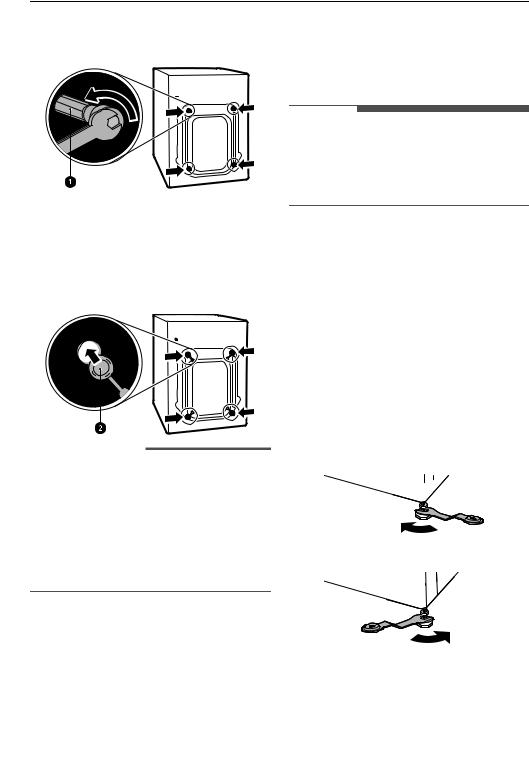
INSTALLATION 13 EN
1 Starting with the bottom two transit bolts a, use the spanner (included) to fully loosen all transit bolts by turning them counterclockwise.
2 Remove the bolt assemblies by wiggling them slightly while pulling them out.
3 Install the hole caps.
•Locate the hole caps b included in the accessory pack or attached on the back.
NOTE
•Save the transit bolts and retainers for future use.
•Transport this appliance for the prevention of breakage as below:
-The transit bolts are reinstalled.
-The power cord is secured to the back of the appliance.
•If the appliance rocks when pushing the top plate of the appliance diagonally, adjust the feet again.
•Check whether the appliance is perfectly level after installation.
NOTE
•Timber or suspended type flooring may contribute to excessive vibration and unbalance. Reinforcement or bracing of the timber floor may need to be considered to stop or reduce excessive noise and vibration.
Adjusting and Levelling the Feet
When installing the appliance, the appliance should be aligned and perfectly level. If the appliance is not aligned and level properly, the appliance may be damaged or may not operate properly.
1 Turn the levelling feet as required if the floor is uneven.
•Do not insert pieces of wood etc. under the feet.
•Make sure that all four feet are stable and resting on the floor.
Levelling the Appliance
Checking the Level
When pushing down the edges of the top plate diagonally, the appliance should not move up and down at all (check both directions).

EN 14 INSTALLATION
NOTE
•Do not install the washing machine on a plinth, stand or elevated surface unless it is manufactured by LG Electronics for use with this model.
2 Check if the appliance is perfectly level using a spirit level a.
3 Secure the levelling feet with the lock nuts b by turning anti-clockwise against the bottom of the appliance.
4 Check if all lock nuts at the bottom of the appliance are secured properly.
NOTE
•Proper placement and levelling of the appliance will ensure long, regular, and reliable operation.
•The appliance must be 100% horizontal and stand firmly in position on a hard flat floor.
•It must not ‘Seesaw’ across corners under the load.
•Do not let the feet of the appliance get wet. Failure to do so may cause vibration or noise.
Using Anti-Slip Sheets
This feature may vary depending on the model purchased.
If you install the appliance on a slippery surface, it may move because of excessive vibration. Incorrect levelling may cause malfunction through noise and vibration. If this occurs, install the antislip sheets under the levelling feet and adjust the level.
1 Clean the floor to attach the anti-slip sheets.
•Use a dry rag to remove and clean foreign objects and moisture. If moisture remains, the anti-slip sheets may slip.
2 Adjust the level after placing the appliance in the installation area.
3 Place the adhesive side aof the anti-slip sheets on the floor.
•The most effective way is to install the antislip sheets under the front feet. If it is difficult to place the sheets under the front feet of the appliance, attach them under the rear feet.
4 Put the appliance on the anti-slip sheets.
•Do not attach the adhesive side a of antislip sheets to the feet of the appliance.
NOTE
•Additional anti-slip sheets are available at LG Electronics service centre.
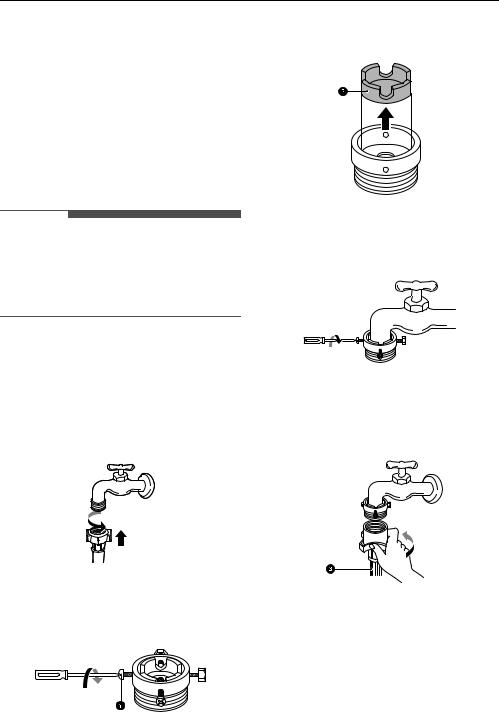
INSTALLATION 15 EN
Connecting the Water Supply Hose
Note for Connection
•Water pressure must be between 100 kPa and 1000 kPa (1.0‒10.0 kgf/cm²). If the water pressure is more than 1000 kPa, a decompression device should be installed.
•Periodically check the condition of the water supply hose and replace the water supply hose if necessary.
NOTE
•Do not overtighten the water supply hose or use mechanical devices to tighten onto the inlet valves.
•No further backflow protection required for connection to the water inlet.
Connecting the Hose to the Water Tap
Connecting Screw-Type Hose to Tap with Thread
Screw the supply hose connector onto the water supply tap.
Connecting Screw-Type Hose to Tap Without Thread
1 Loose the 4 fixing screws a.
2 Remove the guide plate bif the tap is too large to fit the adapter.
3 Push the adapter onto the end of the tap so that the rubber seal is connected to be watertight. Tighten the 4 fixing screws.
4 Push the inlet hose c vertically upwards so that the rubber seal within the hose can adhere completely to the tap and then tighten the hose by screwing it to the right.

EN 16 INSTALLATION
Connecting One Touch Type Hose to Tap Without Thread
1 Unscrew the adapter ring plate d and loose the 4 fixing screws.
2 Remove the guide plate eif the tap is too large to fit the adapter.
3 Push the adapter onto the end of the tap so that the rubber seal is connected to be watertight. Tighten the 4 fixing screws and the adapter ring plate.
4 Pull the connector latch plate f down, push the inlet hose onto the adapter, and release the
connector latch plate. Make sure the adapter locks into place.
NOTE
•After connecting the water inlet hose to the water tap, turn on the water tap to flush out foreign substances (dirt, sand, sawdust, and etc.) in the water lines. Let the water drain into a bucket, and check the water temperature.
Connecting the Hose to the Appliance
Screw the supply hose to the water inlet valve on the back of the appliance.
•Do not connect the hose to the hot water supply for models with one water inlet. Connect to the cold water supply only.
NOTE
•After completing connection, if water leaks from the hose, repeat the same steps. Use the most conventional type of tap for the water supply. In case that the tap is square or too big, remove the guide plate before inserting the tap into the adaptor.

INSTALLATION 17 EN
•Make sure that the hose should not be kinked or trapped.
•When installing the drain hose to a sink, secure it tightly with string.
Installing the Drain Hose
Installing the Drain Hose with the Elbow Bracket
The drain hose should not be placed higher than 100 cm above the floor. Water in the appliance may not drain or may drain slowly.
•Securing the drain hose correctly will protect the floor from damage due to water leakage.
DN
•If the drain hose is too long, do not force it back into the appliance. This will cause abnormal noise.

EN 18 OPERATION
OPERATION
Operation Overview
Using the Appliance
Before the first wash, select the Cotton wash programme and add a half amount of the detergent. Start the appliance without clothes. This will remove possible residues and water from the drum that may have been left during manufacturing.
1 Sort clothes and load items.
•Sort clothes by fabric type, soil level, colour and load size as needed. Open the door and load items into the appliance.
 CAUTION
CAUTION
•Before closing the door, ensure that all clothes and items are inside the tub and not overhanging on the rubber door seal where they will become caught when the door is closed. Failing to do so will cause damage to the door seal and the clothes.
•Remove items from the flexible door seal gasket to prevent clothing and door seal damage.
3
4
5
6
•Add the proper amount of detergent to the detergent dispenser. If desired, add bleach or fabric softener to the appropriate areas of the dispenser.
Turn on the appliance.
•Press the Power button to turn on the appliance.
Choose the desired cycle.
•Press the cycle button repeatedly or turn the cycle selector knob until the desired cycle is selected.
•Now select a wash temperature and spin speed. Pay attention to the fabric care label of your clothes.
Begin cycle.
•Press the Start/Pause button to begin the cycle. The appliance will agitate briefly without water to measure the weight of the load. If the Start/Pause button is not pressed within a certain time, the appliance will shut off and all settings will be lost.
End of cycle.
•When the cycle is finished, a melody will sound. Immediately remove your clothing from the appliance to reduce wrinkling. Check around the door seal when removing the load for small items that may be caught in the seal.
2 Add cleaning products or detergent and softener.
Preparing the Wash Load
Sort the wash load for best washing results, and then prepare the clothes according to the symbols on their care labels.
Sorting the Clothes
•For best washing results, sort your clothes according to the care label stating fabric type and washing temperature. Adjust the spin speed or spin intensity in accordance to the fabric type.

OPERATION 19 EN
•Soil level (Heavy, Normal, Light): Separate clothes according to soil level. If possible, do not wash heavily soiled items with lightly soiled ones.
•Colour (White, Lights, Darks): Wash dark or dyed clothes separately from whites or light colours. Mixing dyed clothes with light clothes can result in dye transfer or discolouration of lighter clothes.
•Lint (Lint producers, Collectors): Wash separately lint producing fabrics from lint collecting fabrics. Lint producers can result in pilling and linting on the lint collectors.
Checking the Clothes before Loading
•Combine large and small items in a load. Load large items first.
•Large items should not be more than half of the total wash load. Do not wash single items. This may cause an unbalanced load. Add one or two similar items.
•Check all pockets to make sure that they are empty. Items such as nails, hair clips, matches, pens, coins and keys can damage both your appliance and clothes.
Checking the Clothes Care Label
The symbols tell you about the fabric content of your garment and how it should be washed.
Symbols on the Care Labels
Symbol |
Wash / Fabric type |
|
|
•Normal Wash
•Cotton, Mixed Fabrics
•Easy Care
•Synthetic, Mixed Fabrics
•Special Delicate Wash
•Delicates
•Hand Wash Only
•Wool, Silk
•Do not wash
NOTE
•The dashes under the symbol give you information about the type of fabric and the maximum allowance of mechanical stress.
•Wash delicates (stockings, underwired bras) in a wash net.
•Close zippers, hooks and strings to make sure that these items do not snag on other clothes.
•Pre-treat dirt and stains by brushing a small amount of detergent dissolved water onto stains to help lift dirt.
Adding Detergents and
Softeners
Detergent Dosage
•Detergent should be used according to the instruction of the detergent manufacturer and selected according to type, colour, soiling of the fabric and the washing temperature. Use only detergents that are suitable for Drum (front load) type washers.
•If too many suds occur, reduce the detergent amount.
•If too much detergent is used, too many suds can occur and this will result in poor washing results or cause heavy load to the motor.

EN 20 OPERATION
•If you wish to use liquid detergent, follow the guidelines provided by the detergent manufacturer.
•You can pour liquid detergent directly into the main detergent drawer if you are starting the wash cycle immediately.
•Do not use liquid detergent if you are using the Delay End function, or if you have selected Pre Wash option, as the liquid will dispense immediately and may harden in the drawer or the tub.
•Detergent usage may need to be adjusted for water temperature, water hardness, size and soil level of the load. For best results, avoid overdosing the detergent. Failing to do so will cause oversudsing.
•Refer to the label of the clothes, before adding the detergent and choosing the water temperature.
•Use only suitable detergents for the respective type of clothing:
-Liquid detergent is often designed for special applications, e.g. for coloured fabric, wool, delicate or dark clothes.
-Powdered detergent is suitable for all types of fabric.
-For better washing results of white and pale garments, use powdered detergent with bleach.
-Detergent is flushed from the dispenser at the beginning of the wash cycle.
1 Open the dispenser drawer.
2 Add the detergent and softener into the appropriate compartments.
aMain wash detergent compartment
bPre-wash detergent compartment
cLiquid fabric softener compartment
3 Gently close the detergent dispenser drawer before starting the cycle.
•Slamming the drawer closed may result in the detergent overflowing into another compartment or dispensing into the drum earlier than programmed.
•Be careful not to get a hand caught in the drawer while closing.
•It is normal for a small amount of water to remain in the dispenser compartments at the end of the cycle.
NOTE
•Do not let the detergent harden. Doing so may lead to blockages, poor rinse performance or odour.
•Full load: According to manufacturer’s recommendation.
•Part load: 1/2 of the normal amount.
•Minimum load: 1/3 of full load.
Fabric Softener Compartment
This compartment holds liquid fabric softener, which is automatically dispensed during the final rinse cycle. Either powdered or liquid fabric softener may be used.
•Pour fabric softer to the maximum fill line. Pouring excessive fabric softener over the
Using the Dispenser
To add detergent dosage to the dispenser:
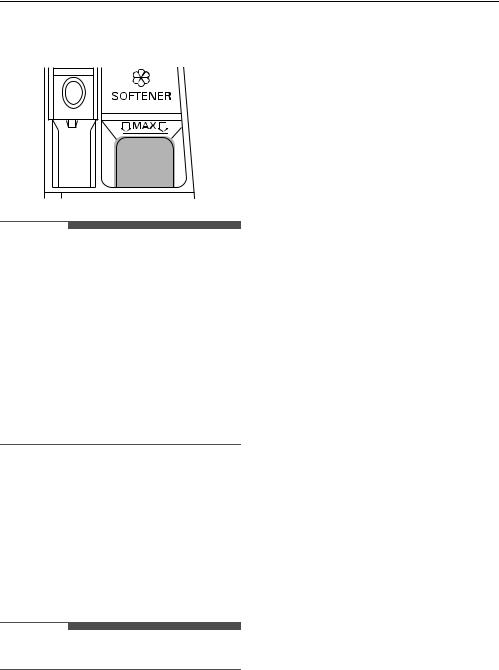
OPERATION 21 EN
maximum fill line can cause it to dispense too early, which may stain the clothes.
NOTE
•Do not pour fabric softener directly onto the clothes in the wash drum, doing so will cause dark staining on the clothes that will be difficult to remove.
•Do not leave the fabric softener in the detergent drawer for more than 1 day. Fabric softener may harden. Softener may remain in the dispenser if it is too thick. The softener should be diluted if the consistency is too thick so that it can flow easily.
•Do not open the drawer when water is being supplied during the wash.
•Solvents (benzene, etc.) must never be used.
Adding Water Softener
A water softener, such as anti-limescale can be used to cut down on the use of detergent in areas with high water hardness level.
•First add detergent, and then the water softener. Dispense according to the amount specified on the packaging.
Adding Detergent Tablets
Detergent tablets can also be used when washing.
1 Open the door and put detergent tablets into the drum before loading the clothes.
2 Load the clothes into the drum and close the door.
NOTE
• Do not put tablets into the dispenser.
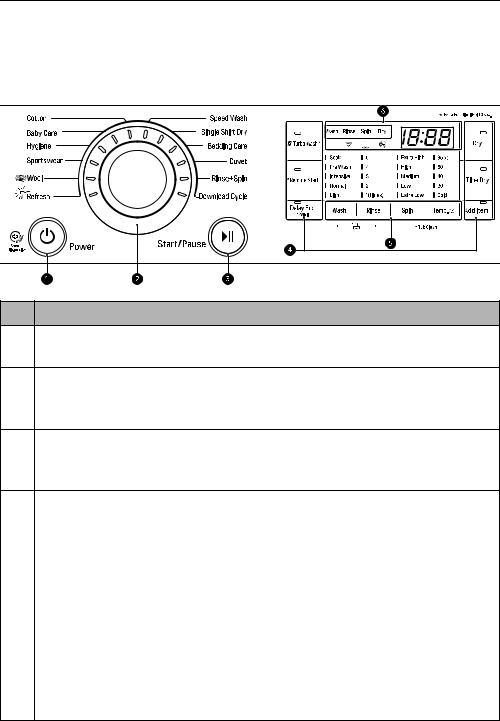
EN 22 OPERATION
Control Panel
The actual control panel may differ from model to model.
Control Panel Features
Description
aPower On/Off Button
•Press this button to turn the washing machine on.
bProgramme Knob
•Programmes are available according to the clothes type.
•The lamp will light up to indicate the selected programme.
cStart/Pause Button
•This button is used to start the wash programme or pause the wash programme.
•If a temporary stop of the wash programme is needed, press this button.
dExtra Options and Functions
•To use the extra functions, press and hold the corresponding button for 3 seconds. The corresponding symbol lights up in the display.
•This allows you to select an additional programmes and will light when selected.
Remote Start
With the LG ThinQ app, you can use a smartphone to control your appliance remotely.
• In order to use this function, refer to SMART FUNCTIONS.
Wi-Fi
Press and hold the Delay End button for 3 seconds to initiate the connection of the appliance to the LG ThinQ application.
iChild Lock
Use this option to disable the controls. This function can prevent children from changing cycles or operating the appliance.

OPERATION 23 EN
Description
eCustomizing Washing Programme Buttons
Use these buttons to adjust the water temperature, spin speed and soil level settings for the selected programme.
•The current settings are shown in the display.
•Press the button for that option to select other settings.
fDisplay
•The display shows the settings, estimated remaining time, options, and status messages. When the appliance is turned on, the default settings in the display will illuminate.
•While the load weight is sensed automatically, the display on the control panel blinks.
Time and Status Display
Description
aProgramme Status Indicators
•When a washing programme is running, LED for the active stage will blink, and the LEDs for the remaining stages will remain steady. Once a stage is complete, the LED will turn off. If a cycle is paused, the active stage LED will stop blinking.
bEstimated Time Remaining
•When a washing programme is selected, the default time for that programme is displayed. This time will change as options are selected.
•If the display shows ---, then the time will be displayed after the load sensing has detected the load size. This is normal.
•The time shown is only an estimate. This time is based on normal operating conditions. Several external factors (load weight, room temperature, incoming water temperature, etc.) can affect the actual time.
cflights up when the appliance is connected to Wi-Fi network at home.
dilights up when the control panel is locked except for the Power button.
eHlights up when the programme starts and the door is locked.

EN 24 OPERATION
Programme Table
Washing Programme
Cotton |
|
40 °C (Cold to 60 °C) |
|
Max. Load: Rating |
|
|
|
|
|
|
|
Description |
|
Washes normally soiled clothes by combining various drum motions. |
|||
|
|
• Pressing the Start/Pause button without selecting a programme will cause the |
|||
|
|
Cotton programme to begin immediately, using the default settings. |
|||
|
|
|
|
|
|
|
|
|
|
|
|
Baby Care |
|
60 °C |
|
Max. Load 5 kg |
|
|
|
|
|
|
|
Description |
|
Washes baby clothes with gentle motion and better performance. |
|
||
|
|
|
|
|
|
|
|
|
|
|
|
Hygiene |
|
95 °C |
|
Max. Load 3 kg |
|
|
|
|
|
|
|
Description |
|
Washes clothes at a high temperature. |
|
||
|
|
|
|
|
|
|
|
|
|
|
|
Sportswear |
|
30 °C (Cold to 30 °C) |
|
Max. Load 5 kg |
|
|
|
|
|
|
|
Description |
|
Washes special garments like sports and outdoor wear. |
|
||
|
|
• Use for water-repellent fabric laminate used on clothing. |
|
||
|
|
|
|
|
|
|
|
|
|
|
|
Wool |
|
Cold (Cold to 40 °C) |
|
Max. Load 4 kg |
|
|
|
|
|
|
|
Description |
|
Washes hand-washable and machine-washable delicate clothes such as washable |
|||
|
|
wool, lingerie, dresses etc. |
|
||
|
|
• Use detergent for machine washable woolens. |
|
||
|
|
|
|
|
|
|
|
|
|
|
|
Refresh |
|
- |
|
5 items |
|
|
|
|
|
|
|
Description |
|
Uses steam to help reduce wrinkles from dry clothes such as cotton, polyester blend |
|||
|
|
shirts or blouses. |
|
||
|
|
• Clothes may be wet right after the programme is completed. Put the clothes on a |
|||
|
|
hangar to dry out. |
|
||
|
|
|
|
|
|
|
|
|
|
|
|
Speed Wash |
|
40 °C (Cold to 40 °C) |
|
Max. Load 5 kg |
|
|
|
|
|
|
|
Description |
|
Washes small loads of lightly soiled clothes in a short time. |
|
||
|
|
|
|
|
|
|
|
|
|
|
|
Single Shirt Dry |
|
- |
|
1 item |
|
|
|
|
|
|
|
Description |
|
Dry a small load in a short time. |
|
||
|
|
|
|
|
|

|
|
|
OPERATION 25 EN |
|
|
|
|
|
|
|
|
Bedding Care |
|
- |
1 king size |
|
|
|
|
Description |
Helps reduce moisture and odour in duvets, blankets, pillowcases or shams without |
||
|
washing. |
|
|
NOTE
•Check fabric care labels before using this programme. The heated air may damage any items.
Duvet |
|
Cold (Cold to 40 °C) |
|
1 king size |
|
|
|
|
|
|
|
Description |
|
Washes large items such as bed covers, pillows, sofa covers, etc. |
|
||
|
|
|
|
|
|
|
|
|
|
|
|
Rinse+Spin |
|
- |
|
Max. Load 3 kg |
|
|
|
|
|
|
|
Description |
|
Rinses and spins clothes. Use fabric softener if needed. |
|
||
|
|
|
|
|
|
|
|
|
|
|
|
Download Cycle |
|
- |
|
- |
|
|
|
|
|
|
|
Description |
|
This programme allows you to download a new and special washing programme to |
|||
|
|
your appliance with a smartphone. The default programme is Cold Wash. |
|||
|
|
|
|
|
|
|
|
|
|
|
|
NOTE
•Select the appropriate water temperature for chosen wash programme. Always follow garment manufacturer’s care label or instructions when washing to avoid damage to clothes.
•Select the proper wash temperature and spin speed for the desired programmes.
•Actual water temperature may differ from the declared cycle temperature.
•Neutral detergent is recommended.
Extra Options
*1:This option is automatically inserted in the programme and can not be deselected. *2:This option is automatically included in the cycle and can be deleted.
NOTE
• The Delay End option can be selected for every washing programme in the table below.
Programme |
Turbo Wash |
Dry |
Time Dry |
Add Item |
|
|
|
|
|
Cotton |
#*2 |
# |
# |
# |
|
|
|
|
|

EN 26 OPERATION
Programme |
Turbo Wash |
Dry |
Time Dry |
Add Item |
|
|
|
|
|
Baby Care |
# |
# |
# |
# |
|
|
|
|
|
Hygiene |
# |
# |
# |
# |
|
|
|
|
|
Sportswear |
# |
|
|
# |
|
|
|
|
|
Wool |
|
|
|
# |
|
|
|
|
|
Refresh |
|
|
|
|
|
|
|
|
|
Speed Wash |
#*2 |
# |
# |
# |
|
|
|
|
|
Single Shirt Dry |
|
#*1 |
|
# |
|
|
|
|
|
Bedding Care |
|
|
|
|
|
|
|
|
|
Duvet |
# |
|
|
# |
|
|
|
|
|
Rinse+Spin |
|
# |
# |
|
|
|
|
|
|

OPERATION 27 EN
Drying Programme
General Tips for Drying
Use the automatic programmes to dry most loads. Electronic sensors measure the temperature of the exhaust to increase or decrease drying temperatures for faster reaction time and tighter temperature control.
•Cold water tap must be left on during drying cycles.
•This appliance’s automatic process from washing to drying can be selected easily.
•For most drying, make sure all clothes are similar in material and thickness.
•Do not overload the appliance by stuffing too many articles into the drum. Items must be able to tumble freely.
•If you open the door and remove the load before the appliance has finished its programme, remember to press the Start/Pause button.
•After the drying programme is finished, [d(crease reduction) is displayed. At default, the drum will periodically rotate for about 4 hours to reduce creases unless the clothes are unloaded from the drum. To stop this default function, press any button and unload the clothes from the drum.
Woolen Articles
Do not tumble dry woolen articles. Pull them to their original shape and dry them flat.
Woven and Loopknit Materials
Some woven and loopknit materials may shrink, by varying amounts, depending on their quality.
Always stretch these materials out immediately after drying.
Permanent Press and Synthetics
Do not overload your appliance. Take out permanent press articles as soon as the appliance stops to reduce wrinkles.
Baby Clothes and Night Gowns
Always check the manufacturer’s instructions.
Blankets and Duvets
Check fabric care labels on blankets and duvets before using the drying programme. Some blankets and duvets may shrink by the heated air.
Rubber and Plastics
Do not dry any items made from or containing rubber or plastics, such as:
•Aprons, bibs, chair covers
•Curtains and table cloths
•Bathmats
Fiber Glass
Do not dry fiber glass articles in the appliance. Glass particles left in the appliance may be picked up by your clothes and cause skin irritation.
NOTE
•When you turn off the drying cycle of the appliance, the drying fan motor can be operated to save itself for 60 seconds.
•Be careful when removing your clothing from the appliance, as the clothing or appliance may be hot.
•The estimated drying time varies from the actual drying time during the Automatic cycle. The type of fabric, size of the load, and the dryness selected affect drying time.
•When you select drying only, spinning runs automatically for energy efficiency.
Using a Dry Programme
You can customize the programmes by using the following drying functions:
Dry
Use this function for gerneral drying.
Time Dry
Use this function to change the drying time according to the maximum load.
Press the Time Dry button repeatedly to toggle through the selections:
• Drying time: 30/60/90/120/150 minitues

EN 28 OPERATION
Using a Wash and Dry Function
1 Prepare the clothes and load the drum.
•For consistently dry loads, all articles in the load should be similar in material and thickness.
•Do not overload the drum. There should be enough room for clothes to tumble freely.
2 Press the Power button.
3 Select a washing programme and add detergent.
4 Press the Dry or Time Dry button as necessary.
5 Press the Start/Pause button.
Only Using a Dry Function
1 Prepare the clothes and load the drum.
•For consistently dry loads, all articles in the load should be similar in material and thickness.
•Do not overload the drum. There should be enough room for clothes to tumble freely.
2 Press the Power button.
•Do not select a washing programme and do not add a detergent.
3 Press the Dry or Time Dry button as necessary.
4 Press the Start/Pause button.
Extra Options and Functions
You can use the extra options and functions to customize the programmes.
Customizing a Washing Programme
Each programme has default settings that are selected automatically. You may also customize these settings using these buttons.
Wash
Press the Wash button repeatedly until the desired soil level is selected.
•Soak: for excessively dirty clothes
•Pre Wash: for heavily soiled clothes
•Intensive: for normal and heavily soiled clothes
•Normal: for normal soiled clothes
-This option is automatically selected in every washing programme except for Rinse+Spin,
Baby Care.
•Light: for lightly soiled clothes
NOTE
•Selectable options will differ depending on the selected programme.
Rinse
The number of rinses can be selected by pressing the Rinse button. This function is recommended for people with detergent allergies.
Spin
The spin intensity level can be selected by pressing this button repeatedly.
Press the Spin button to select spin speed.
Temp.
This button selects the wash temperature for the selected programme.
Press the Temp. button until the desired setting is lit.
•Select the water temperature suitable for the type of load you are washing. Follow the garment fabric care labels for best results.
